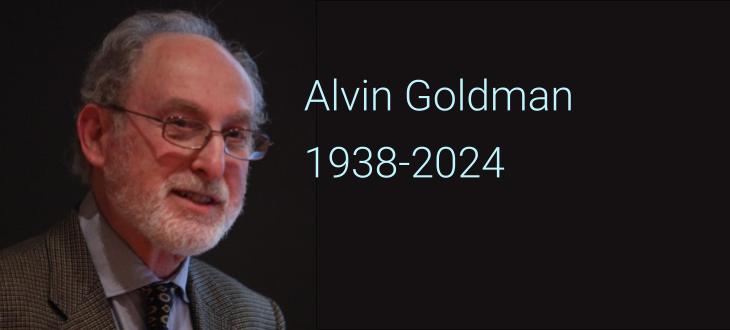Home > News > TRIBUTE ǀ Alvin Goldman (1938-2024)
TRIBUTE ǀ Alvin Goldman (1938-2024)

Many of us have had the opportunity to interact or collaborate with philosopher Alvin Goldman. His presence at Institut Nicod, on top of several visits and exchanges, was felt in countless discussions of his work in our classes and seminars.
After a PhD at Princeton, Alvin Goldman became a professor at the University of Illinois at Chicago, and then at the University of Michigan. In 1983 he became a professor in philosophy and cognitive science at the University of Arizona in Tucson and joined Rutgers in 2002. He is the author of several monographs, including A Theory of Human Action (1970), Epistemology and Cognition (1986), Knowledge in a Social World (1999), Simulating Minds (2006), in addition to more than 160 articles.
His 1993 book Philosophical applications of cognitive science and his 1991 collection Liaisons systematized the fruitful interactions between philosophy and the cognitive (and social) sciences. Goldman distinguished two perspectives, a producer’s perspective and a consumer’s perspective. At times philosophers consume results from the cognitives sciences, for instance when empirical evidence impinges on philosophical characterizations of knowledge, or of free will. But philosophers also produce theoretical frameworks that influence the way psychology or modelization proceed empirically. Both perspectives are legitimate and the successful enterprise of cognitive science is precisely the result of a balance between them.
Alvin Goldman’s Discrimination and Perceptual Knowledge (1976), and in particular Epistemology and Cognition (1986), represented the inaugural attempt at integrating cognitive science and epistemology in a systematic manner. He played a pivotal role in transforming naturalized epistemology, which was before him little more than a Quinean promise, into testable hypotheses and models. Conceptual analysis remained an important tool for him in providing an account of knowledge and justification, but he demonstrated how epistemology can and should make use of scientific methods to elucidate the nature and causal interactions of our doxastic states and the reliability of belief-forming mechanisms and processes. Although the concept of reliability was already incorporated into the account of knowledge, Goldman was the first to present a reliabilist account of epistemic justification. After his original essay published in the late 1970s, Goldman has continued to provide clarifications and expansions, notably in relation to evidentialism, virtue epistemology, and Bayesian approaches.
Goldman’s book Knowledge in a Social World has left a profound legacy in the understanding of knowledge and its social dimensions. Renowned for his exploration of the role of testimony in knowledge sharing, Alvin Goldman argued that we often acquire knowledge through social sources rather than solely through personal experience. He emphasized the importance of trusting reliable testimony in shaping our beliefs. The book was instrumental in establishing a comprehensive framework for social epistemology, examining how collective knowledge is formed and the implications of social contexts on individual understanding. Alvin’s work delved into the dynamics of communities and social networks, revealing how social practices influence the reliability of knowledge. His innovative models, often referred to as knowledge-generative, highlighted the collaborative nature of knowledge production within institutions and practices, asserting that knowledge arises not just from individual cognition but also from social interaction. Goldman also underscored the essential role of social trust, illustrating how individuals depend on the credibility of sources and communities to navigate an increasingly complex information landscape. Through his discussions on cognitive division of labor, Goldman recognized the value of diverse expertise and perspectives in enhancing collective knowledge and epistemic reliability.
In addition to being a leading non-social and social epistemologist, Alvin Goldman was one of the main advocates of the simulation approach to mindreading, i.e. the human capacity to attribute mental states to self and others. The simulation approach arose in the late 1980’s as an alternative to the dominant assumption that unless an attributor had knowledge of a folk psychological theory involving psychological laws relating mental states and behavior mindreading would be impossible. Science mattered deeply to his brand of philosophizing. In the 1990’s Goldman saw immediately the potential significance of the neuroscientific discovery of mirror neurons for the simulation approach to attributing intentions and especially emotions to others. In his (2006) masterly interdisciplinary book, Simulating Minds : the Philosophy, Psychology and Neuroscience of Mindreading, he not only used much scientific evidence in support of the role of simulation in mindreading, but he also importantly highlighted the limits of the simulation approach in two respects. He argued that replicating another’s mental state (e.g. another’s emotion) in one’s own mind falls short of attributing a mental state to someone else. He further recognized that mental simulation cannot provide a route to knowing one’s own mind or first-person mindreading.
But to really know what a person Alvin was, you would have to visit him at their open-roof house they had with his wife, philosopher Holly Smith, in Tucson. At its center, stood a huge magnificent tree reaching for the sky. Alvin was like this tree. A man who raised philosophy to new heights, never settling for mild positions but always bringing revolution in whatever topic he approached. A man who was unshakable, fierce defendant of his theories against all objections. A man who thought twice about every single word in his carefully crafted writing (which could drive you crazy when co-writing with him). Finally, a warm friend who was a real mentor for many of us, always available to share his love for theories and empirical findings with more junior philosophers and to help them throughout their career.
Roberto Casati, Jérôme Dokic, Pierre Jacob, Gloria Origgi, Frédérique de Vignemont




